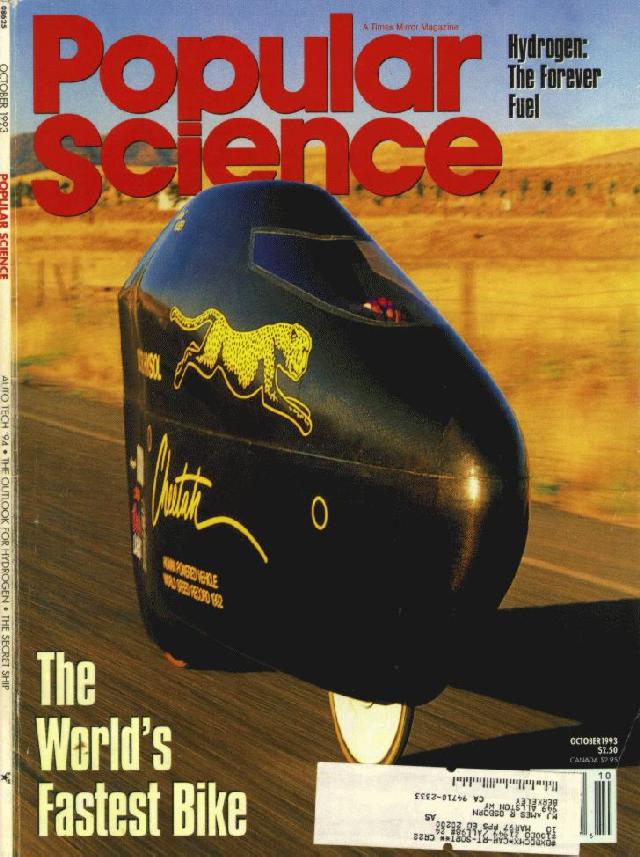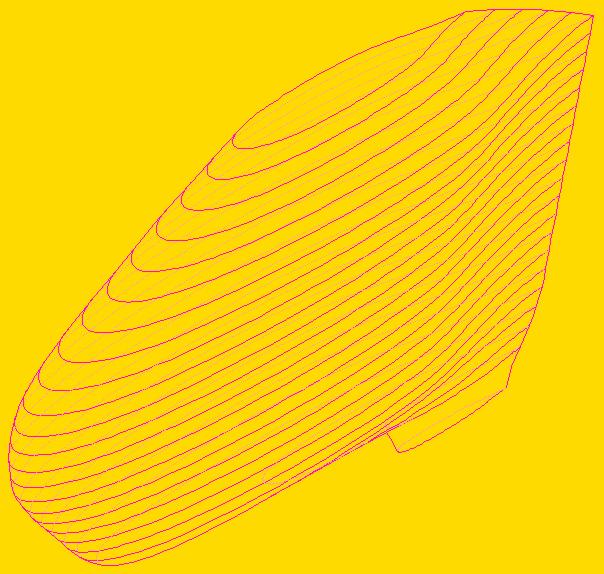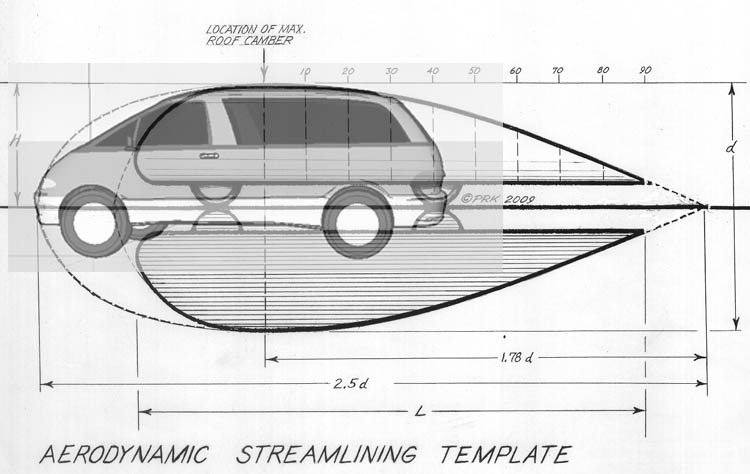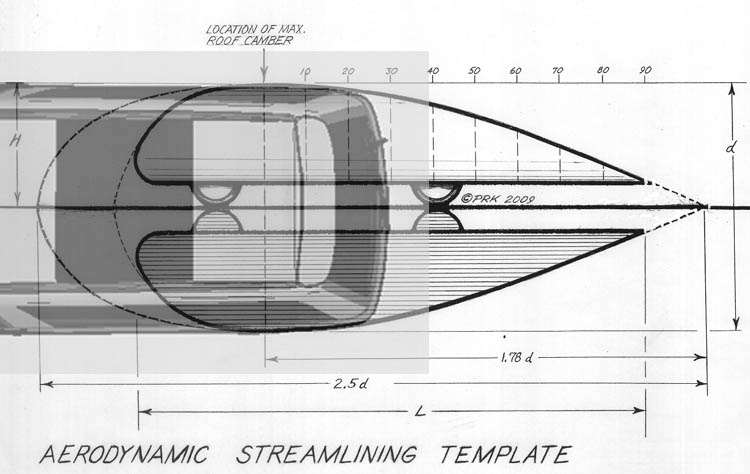 07-20-2009, 09:51 PM
07-20-2009, 09:51 PM
|
#11 (permalink)
|
|
Master EcoModder
Join Date: May 2009
Location: New Jersey
Posts: 389
Thanks: 25
Thanked 59 Times in 38 Posts
|
Quote:
Originally Posted by Bicycle Bob

Thanks for the source postings. The bible I've been going by is "Theory of Wing Sections" by Abbott and Von Doenhoff, which takes up the history from just after that first chart. Being concerned with wings, it makes sense for them to not go beyond 21% thick, as they want to leave something in hand for some angle of attack. That had persuaded me to go to 25% on a strut myself.
The NACA tests progressed to "laminar flow shapes" of which the 67-series is the most extreme. These are almost lab curiosities, first achieved in production on the P-51, using bondo over the flush rivets. No such shape can tolerate a blemish, let alone a wheel opening, without tripping the boundary layer into turbulence in a wake spreading 15 deg to each side. The "standard roughness" in these tests, which double the drag, consists of .011" grit, covering 5-10% of the area, just within 8% of the length from the leading edge. (like small bug strikes)
Here are a few selected data points from my book:
The lowest cd shown was for a shape that didn't make a stable wing, so there may be much room for exploration. That wing is the 0010-35, in the old system, 10% thick. At Re from 3 to 9 million, the cd is .003 near-polished, and .009 "rough."
The 2424 shape is similar to the 2412 It gets a cd of .008 smooth and .013 rough, at 24% thickness, while the 12% thick shape gets .0065 smooth and .010 rough.
Moving on to the later laminar shapes, which rely on perfect conditions to maintain a laminar boundary layer back as far as the second term in the identifier, usually the widest part of the shape. A 63-006 shape is a 6-series, (laminar) with 30% laminar flow, no camber for lift, and 6% thick. - ie: 100" long, 6" thick. The 67-025 is 70% laminar, no camber, 25% thick. The 66 and 67s are slipprier than the 63 and 64s, but who can wait for 70% of the way back for the first seam, wheel opening, or other feature?
Shape: cd around 6 mil Re. cd with standard roughness
63-006 .0043 .0087
63-021 .0055 .011
64-009 .0043 .0087
64-015 .0047 .0097
64-021 .0054 .018
66-006 .0032 .0085
66-021 .0041 .013
These all show a clear preference for the slender shape, despite the extra surface drag. The text helps illustrate the trends with increasing speed, and gives examples that improve, such as the 65-418, with less separation as you go faster. This is not uncommon, but the devil is in the details, and these shapes are only a rough indication about designing practical cars.
Re: underflow - it is good if done right, but blocking it off is a cheap fix that gives downforce, which is good for road racing, not cruising. Underflow is not really hard to visualize; it is like a duct, but with the boundary layer on the flat side moving and helping stabilize things. After F1 banned the vacuum cleaner cars, they did quite well with underbody venturi systems.
|
Great stuff bob! 
I've been using a RE of 6million for all of my tests. It seems perfect for a 10foot chord at 65mph.
I have read that the 6 series NACA foils are susceptible to imperfections on the body as well. The reason i am so interested in the shape, while not practical for a 4 wheeled car, is because it seems quite ideal to use for a bicycle and/or motorcycle. Funny thing i say that because there are quite a few high speed HPV's that use a shape very close to the 65,66, and 67.
Example 1: Sam Whittingham's Varna Diablo: the worlds fastest HPV @ 82mph

Example 2: The Cheetah bike

This team used the 6 series foil from top to bottom when shaping their fairing, as seen here:

They went 65mph with this design.
|
|
|

|
 Today Today
|
|
|
|
 Other popular topics in this forum...
Other popular topics in this forum...
|
|
|
|
 07-20-2009, 11:39 PM
07-20-2009, 11:39 PM
|
#12 (permalink)
|
|
EcoModding Apprentice
Join Date: May 2008
Location: N. Saskatchewan, CA
Posts: 1,805
Thanks: 91
Thanked 460 Times in 328 Posts
|
Yes, the NACA 6-series has been very popular with HPV builders, although between the seams, ripples, and vibration, they probably seldom get up to even 20% laminar flow, which makes the shape just a reasonable guess. The Varna is completely done by artist's methods. George sends persistent theorists to argue with me and leave him be, and won't even run a tuft test.
|
|
|

|
 07-21-2009, 12:48 AM
07-21-2009, 12:48 AM
|
#13 (permalink)
|
|
Master EcoModder
Join Date: Aug 2008
Location: The Wet Coast, Kanuckistan.
Posts: 1,275
Thanks: 100
Thanked 306 Times in 178 Posts
|


I love how these look. The charm of the hand drawn templates is something I miss with most everything done with computers now.
I think this is a good visualization tool. I have been trying to find something like this for a while.
Now I just have to decide where to cut it off. I may just build a full length detachable cone section aft of the kamm. Why should Basjoos have all the fun?
__________________
Vortex generators are old tech. My new and improved vortex alternators are unstoppable.
"Itís easy to explain how rockets work but explaining the aerodynamics of a wing takes a rocket scientist.


|
|
|

|
|
The Following User Says Thank You to orange4boy For This Useful Post:
|
|
 07-21-2009, 12:59 AM
07-21-2009, 12:59 AM
|
#14 (permalink)
|
|
EcoModding Apprentice
Join Date: May 2008
Location: N. Saskatchewan, CA
Posts: 1,805
Thanks: 91
Thanked 460 Times in 328 Posts
|
Somehow, it looks almost identical to the Clark-Y, a very popular wing of the period, so you'd probably want to adjust it nose down a degree or so to kill the lift.
|
|
|

|
 07-21-2009, 01:19 AM
07-21-2009, 01:19 AM
|
#15 (permalink)
|
|
Master EcoModder
Join Date: Aug 2008
Location: The Wet Coast, Kanuckistan.
Posts: 1,275
Thanks: 100
Thanked 306 Times in 178 Posts
|
The golden egg is blushing at your inadvertent compliment.  She weighs a sprightly 3800lbs. I'm fairly certain she won't be lifting off at highway speeds.
Or perhaps you're right and I'm going to be the proud owner of the first ever STOL minivan. 
Isn't lift unavoidable when streamlining? The shape is a wing after all. Or are you referring to keeping the underbelly pointing down so as not to create pressure under the car? I suppose added to the lift, that would start to really add up.
The Previa is already nose down because I have removed all the rear seats so if that's the idea, I'm good.
Last edited by orange4boy; 07-21-2009 at 01:29 AM..
|
|
|

|
|
The Following User Says Thank You to orange4boy For This Useful Post:
|
|
 07-21-2009, 09:01 PM
07-21-2009, 09:01 PM
|
#16 (permalink)
|
|
Master EcoModder
Join Date: Dec 2007
Location: Upstate SC
Posts: 1,088
Thanks: 16
Thanked 677 Times in 302 Posts
|
Quote:
Originally Posted by orange4boy

Why should Basjoos have all the fun?
|
I consider my boattail to be a cargo extension module that just happens to also increase the mileage of the car. The interior cargo space extends to within about a foot of the tip of the boattail. |
|
|

|
 07-23-2009, 01:22 PM
07-23-2009, 01:22 PM
|
#17 (permalink)
|
|
Master EcoModder
Join Date: May 2009
Location: New Jersey
Posts: 389
Thanks: 25
Thanked 59 Times in 38 Posts
|
Quote:
Originally Posted by basjoos

I consider my boattail to be a cargo extension module that just happens to also increase the mileage of the car. The interior cargo space extends to within about a foot of the tip of the boattail.
|
On that note, thats part of the reason why i am anxious to make a fairing for my Ninja. A streamlined shape will elongate my bike a good foot or 2 in the front and another foot in the rear. I plan on designing some sort of drawer trunk in the front of the fairing (theres going to be a lot of dead space) so as the small weight of luggage i usually carry can be placed over the front of the bike, which makes it more stable. |
|
|

|
 07-25-2009, 01:31 PM
07-25-2009, 01:31 PM
|
#18 (permalink)
|
|
Master EcoModder
Join Date: Jan 2008
Location: Sanger,Texas,U.S.A.
Posts: 16,534
Thanks: 24,520
Thanked 7,436 Times in 4,817 Posts
|
speed/open-closed
Quote:
Originally Posted by orange4boy

Link to original post
Link to original post
The above is the intro the the templates which were posted separately by aerohead.
Thanks for the charts and template. Good timing for me because I'm going to start my kamm-back soon. I have several neophyte questions that have not been answered so far (that I could find).
1. Does the optimal fineness ratio change with speed? I am hoping that if I make mine lower, that is to make the slope steeper, but I stay below say 55mph, will the flow stay attached? My aim is to reduce the size of the tail, and I could live with the slower speeds to get the wake and tail as small as possible. I don't think the Egg will ever go "super-critical". Sounds like you would need a flux capacitor for that.
2. Does the kamm-back or boattail have to be closed off to get the best result? How much difference is there between a closed off and an open ended tail?
|
(1) The ratio does not vary with speed,as it is fixed by the critical Reynolds number which for cars,occurs at about 20-mph.At 20-mph and above,you've established the turbulent boundary layer and Cd minimum which remains constant up to the beginning of transonic flow,at about 250-mph.--------- If you lengthen the "pumpkin-seed" you will increase friction drag,although friction drag is only about 7% of total drag for a car so it's not a biggie.The only reason I depicted the 2.5:1 ratio,is that below that you run the risk of early separation and high form drag.--------------------------------------------- (2) Sepp has reported that an open shell did not offer as much drag reduction as a closed shell on his Nissan truck.Bob Parson's open boattail for his Vanagon did not return as high a savings as the closed unit on my Transporter but his "lifestyle" dictated an open plan and he was happy to live with the difference.Open units may allow"circulation" which always has to be paid for at the pump. |
|
|

|
|
The Following User Says Thank You to aerohead For This Useful Post:
|
|
 07-25-2009, 04:05 PM
07-25-2009, 04:05 PM
|
#19 (permalink)
|
|
Batman Junior
Join Date: Nov 2007
Location: 1000 Islands, Ontario, Canada
Posts: 22,541
Thanks: 4,085
Thanked 6,989 Times in 3,619 Posts
|
Phil, your post has reminded me to add "enclose rear of Kammback" to my to-do list. Thanks.
It's easy to do with a piece of cut plexiglass that still preserves my rear view.
|
|
|

|
 07-25-2009, 05:01 PM
07-25-2009, 05:01 PM
|
#20 (permalink)
|
|
Master EcoModder
Join Date: Jan 2008
Location: Sanger,Texas,U.S.A.
Posts: 16,534
Thanks: 24,520
Thanked 7,436 Times in 4,817 Posts
|
thinks
Quote:
Originally Posted by theycallmeebryan

I would like to hear what aerohead thinks about what i have talked about so far.
 |
theycallmeebryan,good feedback and good eyes.Perhaps you can help out on Marchaj's table for sections.My thought was that at the Reynolds number listed,the relationship between drag and fineness ratios/thickness, would be be maintained across the Reynolds number spectrum,as all airfoils perform as a function of Reynolds number ( all else being equal )and that skin friction is the primary source of drag for sections up to stall,where profile drag would dominate.From my fluids text,for sections in 2-dimensional flow,thickness ratios below 2:1 are dominated by profile drag.Above 4:1 skin friction is the dominant player.--------------------------------------- With respect to the 67-series wing section,I have only data for the 67,1-215 section.It shows a drag minimum at Re 6-million-------------------- Here's the freaky thing about wings.In my Abbott and von Doenhoff' Theory of Wing Sections,on page 28,Chapter-1 it says that"section data are not applicable to wings of low aspect ratio.In fact,an entirely different theory applies to wings of very low aspect ratio." It cites Reference 61,Jones,Robert T.:Properties of Low-aspect Ratio Pointed Wings at Speeds below and above the Speed of Sound.NACA TN No. 1032,1946,as source of data for this situation.------------------- The other thing is that for anything other than zero crosswind,a wing,standing on it's head is experiencing a change in angle of attack,lift is induced,which creates a pitching-moment,and also,friction drag increases due to velocity increase due to lift,and pretty soon your Cd min ( @ zero "angle-of-attack") is right out the window.----------------- Sylph was designed around a NACA 66-section( P-51 Mustang ) and while it tunneled out in 1/4-scale with Cd 0.109 it's still 11% dirtier than GM's pumpkin-seed Sunraycer.--------------------------- And evidently,some wings are chosen for "flight Reynolds number" which would not be experienced in a car until over 200-mph.---------------------- I know BicycleBob and others have a much deeper grounding in struts and wing sections,and the station positions make it great to produce these forms,and I'm not in opposition to their use,however,until I dig a little deeper,it seems like we have to temper our enthusiasm for them when considering the context of their design and limitations imposed by ground-effect,crosswinds,extremely low aspect ratio,spanwise circulation,etc..
|
|
|

|
|